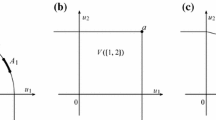Abstract
In cooperative Cournot oligopoly games, it is known that the β-core is equal to the α-core, and both are non-empty if every individual profit function is continuous and concave (Zhao, Games Econ Behav 27:153–168, 1999b). Following Chander and Tulkens (Int J Game Theory 26:379–401, 1997), we assume that firms react to a deviating coalition by choosing individual best reply strategies. We deal with the problem of the non-emptiness of the induced core, the γ-core, by two different approaches. The first establishes that the associated Cournot oligopoly Transferable Utility (TU)-games are balanced if the inverse demand function is differentiable and every individual profit function is continuous and concave on the set of strategy profiles, which is a step forward beyond Zhao’s core existence result for this class of games. The second approach, restricted to the class of Cournot oligopoly TU-games with linear cost functions, provides a single-valued allocation rule in the γ-core called Nash Pro rata (NP)-value. This result generalizes Funaki and Yamato’s (Int J Game Theory 28:157–171, 1999) core existence result from no capacity constraint to asymmetric capacity constraints. Moreover, we provide an axiomatic characterization of this solution by means of four properties: efficiency, null firm, monotonicity, and non-cooperative fairness.
Similar content being viewed by others
References
Aumann R. (1959) Acceptable points in general cooperative n-Person Games. In: Tucker luce (eds) Contributions to the theory of games. IV. Annals of Mathematics Studies, Vol. 40. Princeton University Press, Princeton
Bondareva O. N. (1963) Some applications of linear programming methods to the theory of cooperative games. Problemi Kibernetiki 10: 119–139
Chander P., Tulkens H. (1997) A core of an economy with multilateral environmental externalities. International Journal of Game Theory 26: 379–401
Driessen T. S., Meinhardt H. I. (2005) Convexity of oligopoly games without transferable technologies. Mathematical Social Sciences 50: 102–126
Funaki Y., Yamato T. (1999) The core of an economy with a common pool resource: A partition function form approach. International Journal of Game Theory 28: 157–171
Helm C. (2001) On the existence of a cooperative solution for a coalitional game with externalities. International Journal of Game Theory 30: 141–146
Kaneko M. (1977) The ratio equilibria and the core of the voting game g(n, w) in a public goods economy. Econometrica 45: 1589–1594
Moulin H., Watts A. (1997) Two versions of the tragedy of the commons. Economic Design 2: 399–421
Norde H., Do K. H. P., Tijs S. (2002) Oligopoly games with and without transferable technologies. Mathematical Social Sciences 43: 187–207
Okuguchi K., Szidarovszky F. (1990) The theory of oligopoly with muti-product firms. Springer-Verlag, Berlin
Rosenthal R. (1971) External economies and cores. Journal of Economic Theory 3: 182–188
Shapley L. S. (1967) On balanced sets and cores. Naval Research Logistics Quaterly 14: 453–460
van den Brink, R. (2009). Efficiency and collusion neutrality of solutions for cooperative TU-games. Tinbergen Institute Discussion Papers, 09-065/1, Tinbergen Institute.
Zhao J. (1999a) A necessary and sufficient condition for the convexity in oligopoly games. Mathematical Social Sciences 37: 189–204
Zhao J. (1999b) A β-core existence result and its application to oligopoly markets. Games and Economic Behavior 27: 153–168
Author information
Authors and Affiliations
Corresponding author
Rights and permissions
About this article
Cite this article
Lardon, A. The γ-core in Cournot oligopoly TU-games with capacity constraints. Theory Decis 72, 387–411 (2012). https://doi.org/10.1007/s11238-011-9256-5
Published:
Issue Date:
DOI: https://doi.org/10.1007/s11238-011-9256-5




